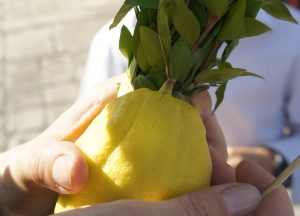Walking down the main streets of Jerusalem to frolicsome music, surrounded by children playing and families greeting each other under shelters constructed from wood and foliage, is a strange experience for an English believer living in Israel. These structures and the light-hearted festival atmosphere appear in time for Sukkot, or the Feast of Tabernacles. This celebratory occasion follows a period of introverted self-analysis known as the Yamim Nora’im (“Days of  Awe”), and presents the opportunity for families to gather together to build a sukka (booth) and decorate it with fruit. The “Four Species,” or four plants, are used to build the sukka, as described in Leviticus 23:40, both as a gesture of thankfulness and also as a reminder of dwelling in the desert. Sukkot originated as an agricultural feast, centered on rejoicing in the bountiful harvest from the Lord (Deut. 16:15). Today, however, Jerusalemites and Jewish communities all across the world take the opportunity to relax and spend time in the sukkot (booths) of coffee shops and restaurants. The commandment to celebrate Sukkot is found in Leviticus 23:33-36:
Awe”), and presents the opportunity for families to gather together to build a sukka (booth) and decorate it with fruit. The “Four Species,” or four plants, are used to build the sukka, as described in Leviticus 23:40, both as a gesture of thankfulness and also as a reminder of dwelling in the desert. Sukkot originated as an agricultural feast, centered on rejoicing in the bountiful harvest from the Lord (Deut. 16:15). Today, however, Jerusalemites and Jewish communities all across the world take the opportunity to relax and spend time in the sukkot (booths) of coffee shops and restaurants. The commandment to celebrate Sukkot is found in Leviticus 23:33-36:
On the fifteenth day of the seventh month the Lord’s Feast of Tabernacles begins, and it lasts for seven days.
The first day is a sacred assembly; do no regular work. For seven days present offerings made to the Lord by fire, and on the eighth day hold a sacred assembly; do no regular work.
One of the important aspects of Sukkot is the commandment to rejoice: “Be joyful at your Feast” (Deut. 16:14). For Jewish and non-Jewish believers alike, this is a reminder to thank the Lord for his provision. Originally, Sukkot had strong ties to the land and was thus a feast to celebrate the harvest (Chag Ha-Asif, the Feast of Ingathering), which is why fruit is hung from the leafy boughs of the sukka. Today, in our rich and plentiful society, the agricultural ties have less meaning. Nonetheless, Sukkot is a time to reflect upon and thank the Lord for our own “harvest,” both literally, for the food we have, and also spiritually, for the metaphysical provision from God. For Jewish people today, the pastoral relevance has been somewhat subsumed into the celebratory atmosphere of the festival. For believers, however, Sukkot should be an occasion to rejoice and give thanks for spiritual provision.
During Sukkot, a sacrificial water libation was performed at the temple, led by the High Priest. The significance of this ritual was twofold: firstly, prayer for the grace of God to send rain on Israel, and secondly, as a prophetic messianic act, looking forward to the outpouring of the Holy Spirit. Jesus, our High Priest, fulfils this aspect of Sukkot, as our spiritual “water.” As he said during the feast: “If anyone is thirsty, let him come to me and drink. Whoever believes in me, as the Scripture has said, streams of living water will flow from within him” (John 7:37-38). Just as the Lord supplied manna and quail in the desert, so he provides spiritual “food” in our desert.
The temporary shelters made during Sukkot are a reminder of the temporary dwellings of the Israelites in the desert after their escape from Egypt. In a similar vein to Pesach, another pilgrimage festival, Sukkot is a time to recall the Lord’s provision for and protection of his people. For Jews, this has a unique significance as the festival evokes gratitude and also brings to mind the times when the Lord has rescued them from adversity. By being removed from one’s home and transferred to the flimsy sukka, one is forced to rely more prominently on the Lord’s strength. Whilst this is typically an inherently Jewish festival (although Gentiles are welcome in the sukka), non-Jewish believers can also identify with the way in which the Lord dwells with those who believe in him: The Word became flesh and tabernacled (eskenosen) among us (John 1:14a).
significance as the festival evokes gratitude and also brings to mind the times when the Lord has rescued them from adversity. By being removed from one’s home and transferred to the flimsy sukka, one is forced to rely more prominently on the Lord’s strength. Whilst this is typically an inherently Jewish festival (although Gentiles are welcome in the sukka), non-Jewish believers can also identify with the way in which the Lord dwells with those who believe in him: The Word became flesh and tabernacled (eskenosen) among us (John 1:14a).
Sukkot can therefore be a time of reflection upon the gift of God’s “tabernacling,” or his dwelling, with us, his believers. Whilst we use Sukkot as a chance to recall the Jewish peoples’ tabernacles in the desert and give thanks for this provision, Jewish and non-Jewish believers can also give thanks for God’s presence with us.
Sukkot presents an opportunity to not only look back and remember the origins of the festival, but mostly importantly, to look forward to the messianic hope of restoration. For the Jewish people today, Sukkot is a time of retrospective pondering, looking backwards. For believers in Jesus, this can also be a time of looking forward to the messianic era. For both Jews and Christians, the sukka can be a reminder that our home is merely temporary, that we are all momentarily homeless and looking forward to the messianic redemption. For this reason, it is important to rejoice, as we are commanded, in God’s provision and protection, and to look forward in faith to the future restoration.
Now the dwelling of God is with men, and he will live with them.
They will be his people, and God himself will be with them and be their God. (Rev. 21:3)
Hannah Gyde